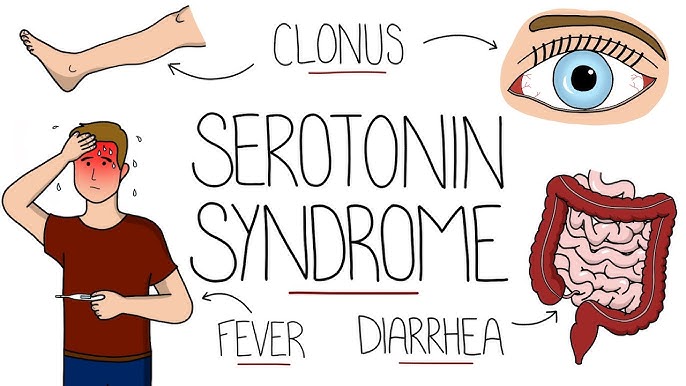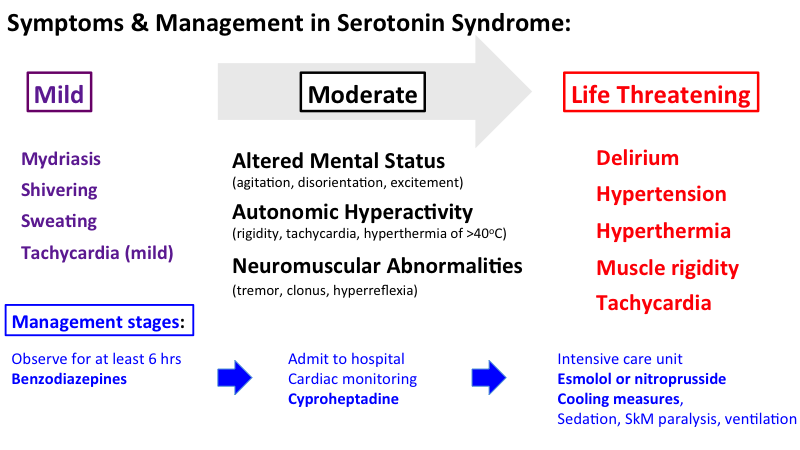Serotonin syndrome is a potentially life-threatening condition caused by an excess of serotonin in the body.
It typically occurs as a result of taking certain medications or combining multiple medications that increase serotonin levels. Here are some complications and potential risks associated with serotonin syndrome:
- Severe agitation and restlessness: Individuals with serotonin syndrome may experience intense agitation, restlessness, and an inability to sit still. This can be distressing and may require immediate medical attention.
- Delirium and confusion: Serotonin syndrome can cause changes in mental status, including delirium, confusion, and disorientation. These symptoms can be alarming and may require medical intervention.
- Rapid heart rate and high blood pressure: Increased serotonin levels can lead to a rapid heart rate (tachycardia) and high blood pressure (hypertension). In severe cases, this can pose a risk to cardiovascular health and may require medical management.
- Tremors and muscle rigidity: Serotonin syndrome can cause involuntary muscle movements, tremors, and muscle rigidity. These symptoms can be uncomfortable and may interfere with normal movement and coordination.
- Seizures: In severe cases, serotonin syndrome can lead to seizures, which are sudden and uncontrolled electrical disturbances in the brain. Seizures require immediate medical attention and can be life-threatening.
- Hyperthermia (elevated body temperature): Serotonin syndrome can cause a significant increase in body temperature (hyperthermia). This can lead to heat stroke, organ damage, and other complications if not promptly treated.

It’s important to note that serotonin syndrome is a medical emergency, and individuals suspected of having this condition should seek immediate medical attention.
Prompt diagnosis and treatment are essential to prevent complications and ensure a positive outcome.
If you believe you may be experiencing serotonin syndrome or have concerns about your medication regimen, it is important to consult with a healthcare professional for proper evaluation and guidance.
Expert opinion from Alex T. Thomas
MD · 40 years of experience · USA
Coma, disseminated intravascular coagulation, seizures, kidney failure, rhabdomyolysis, myoglobinuria, ventricular tachycardia, and metabolic acidosis are the complications of serotonin syndrome. It can also lead to death when left untreated.
Expert opinion from Ilya Aleksandrovskiy
M.D., MBA · 5 years of experience · USA
Usually, serotonin syndrome does not cause any problem once serotonin levels are back to normal. But if left untreated can cause seizures and death.
Expert opinion from Mohan P. Abraham
M.D., FAAFP (Family Physician) · 40 years of experience · USA
Complications of serotonin syndrome include:- 1) Acute kidney injury, 2) Disseminated Intravascular Coagulation (DIC), 3) Metabolicacidosis, 4) Severe Hyperthermia.
Certainly! Here are some additional details about serotonin syndrome:

Causes: Serotonin syndrome is primarily caused by an excessive accumulation of serotonin in the central nervous system. This can occur due to various factors, including:
- Medication interactions: Serotonin syndrome commonly occurs when two or more medications that increase serotonin levels are taken together. This can include certain antidepressants (such as selective serotonin reuptake inhibitors, or SSRIs), serotonin-norepinephrine reuptake inhibitors (SNRIs), monoamine oxidase inhibitors (MAOIs), migraine medications (triptans), and others.
- Overdose or excessive use: Taking higher-than-recommended doses of medications that increase serotonin levels can also lead to serotonin syndrome.
- Illicit drugs: Certain recreational drugs, such as MDMA (ecstasy) and hallucinogenic substances like LSD, can contribute to serotonin syndrome.
Symptoms: Serotonin syndrome can manifest with a variety of symptoms, which can range from mild to severe. Common signs and symptoms include:
- Agitation, restlessness, and anxiety
- Confusion and disorientation
- Rapid heart rate (tachycardia) and high blood pressure (hypertension)
- Dilated pupils and increased sweating
- Tremors and muscle rigidity
- Diarrhea and gastrointestinal disturbances
- Headache and shivering
- Seizures (in severe cases)
Diagnosis: Serotonin syndrome is primarily diagnosed based on clinical symptoms and a thorough evaluation of the individual’s medical history, medication use, and recent drug exposures. There are no specific laboratory tests to confirm serotonin syndrome, but certain tests may be done to rule out other potential causes.
Treatment: The primary treatment for serotonin syndrome involves discontinuing any medications or substances that may be contributing to the condition.
Supportive care is provided to manage symptoms, and in severe cases, hospitalization may be required for close monitoring and treatment of complications. Medications that block serotonin receptors, such as cyproheptadine, may be administered in severe cases to help reduce serotonin levels.
It’s important to note that serotonin syndrome can be a medical emergency, and prompt medical attention is crucial.
If you suspect serotonin syndrome or experience concerning symptoms after starting or changing medications, seek immediate medical help or contact a healthcare professional. They can provide appropriate evaluation, guidance, and treatment.





